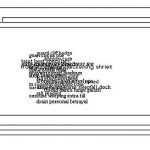2004
Diana Lobb tackles the legacy of positivism and the politics of chaotics.
For all the talk of cyber-difference, screens still behave like pages. The contributors in section six have developed, in response, a digital aesthetics unlike that of print.
John Cayley dadas up the digital, revealing similarities of type across two normally separate, unequal categories: image and text. "Neither lines nor pixels but letters," finally, unite.
Camille Utterback exposits "embodied interaction with symbolic spaces" – the body and language of digital art.
In this series of "media-element field explorations," Bill Seaman suggests configurations for the shape of the virtual artist-author to come.
The second in a series of two essays developing the parallels between Iraq and the Peloponnesian Wars, between classical Empire and postmodern Imperialism.
Andrew Stern contrasts the "drama" of Façade against cognitive realism.
The parallels (and oppositions) between hypertext and AI are brought out in section five.
Mark Bernstein and Diane Greco address "the utility question."
Eastgate Systems alumns Diane Greco and Mark Bernstein explain two "exotic tools for hypertext narrative."
Ken Perlin finds hypertext templates useful as they are used, not in tool form.
Camille Utterback figures the mouse click as weakly interactive.
Techno-poet Stephanie Strickland surveys the digital artistic practices of her peers and presents a "paradigm for interaction."
Stephanie Strickland makes marks an intervention across the "I."
Choosing between James Joyce and Stephen King means choosing between engagement and immersion. Or does it?
Who says hypertext readers have more brains than gamers? Not Henry Jenkins.
Are actors really acting when they're characters? How about characters - can they really act? Richard Schechner asks twice.
J. Yellowlees Douglas and Andrew Hargadon on the affective side of hypertexts via "schemas, scripts, and the fifth business."



